
The Hollywood Revue of 1929, or simply The Hollywood Revue, is a 1929 American pre-Code musical comedy film released by Metro-Goldwyn-Mayer. It was the studio's second feature-length musical, and one of their earliest sound films. Produced by Harry Rapf and Irving Thalberg and directed by Charles Reisner, it features nearly all of MGM's stars in a two-hour revue that includes three segments in Technicolor. The masters of ceremonies are Conrad Nagel and Jack Benny.
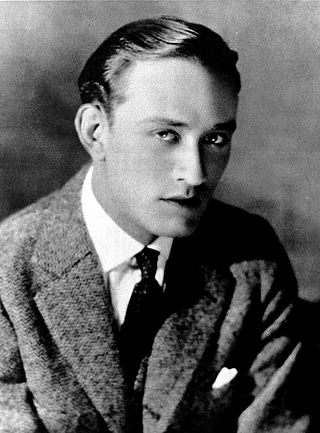
John Conrad Nagel was an American film, stage, television and radio actor. He was considered a famous matinée idol and leading man of the 1920s and 1930s. He was given an Honorary Academy Award in 1940, and three stars on the Hollywood Walk of Fame in 1960.

Glorious Betsy is a 1928 sound part-talkie drama film. In addition to sequences with audible dialogue or talking sequences, the film features a synchronized musical score and sound effects along with English intertitles. The soundtrack was recorded using the Vitaphone sound-on-disc system. The film is based on the 1908 play of the same name by Rida Johnson Young, and it stars Dolores Costello. It was produced by Warner Bros. and nominated for an Academy Award for Best Writing, Adaptation in 1929. The film was directed by Alan Crosland with cinematography by Hal Mohr.

Up the River is a 1930 American pre-Code comedy film directed by John Ford, and starring Claire Luce, Spencer Tracy and Humphrey Bogart. The plot concerns escaped convicts, as well as a female convict. It was the feature film debut role of both Tracy and Bogart. Despite Bogart being billed fourth, Tracy's and Bogart's roles were almost equally large, and this is the only film in which they appeared together. Up the River is also Bogart's only film directed by John Ford. Bogart's image is featured with Luce on some of the film's posters rather than Tracy's since Bogart was the romantic lead with Luce. Fox remade the film in 1938 starring Preston Foster and Tony Martin playing their roles.

Song of the Flame is a 1930 American pre-Code musical film photographed entirely in Technicolor. Based on the 1925 operetta of the same name, the film features a screenplay by Gordon Rigby adapted from the musical book written by Oscar Hammerstein II and Otto A. Harbach for the operetta. The movie also features many of the songs from the operetta which used lyrics by Hammerstein and Orbach and music by George Gershwin and Herbert Stothart. The film was produced and distributed by First National Pictures. It was the first color film to feature a widescreen sequence, using a process called Vitascope, the trademark name for Warner Bros.' widescreen process. The film, based on the 1925 Broadway musical of the same name, was nominated for an Academy Award for Sound Recording. It is part of the tradition of operetta films, popular at the time.

No, No, Nanette is a 1930 American pre-Code musical comedy film with Technicolor sequences that was directed by Clarence G. Badger and released by First National Pictures. It was adapted from the play of the same title by Otto A. Harbach and Frank Mandel. No, No, Nanette was a popular show on Broadway, running for 321 performances, and was produced and directed by Harry Frazee.
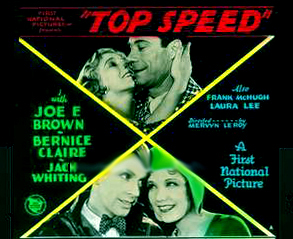
Top Speed is a 1930 American Pre-Code musical comedy film released by First National Pictures, a subsidiary of Warner Brothers. It was based on a 1929 stage musical of the same name by Harry Ruby, Guy Bolton and Bert Kalmar. The film stars Joe E. Brown, Bernice Claire, Jack Whiting, Laura Lee, and Frank McHugh.

Going Wild is a 1930 Warner Brothers pre-Code comedy film based on the 1910 play The Aviator by James Montgomery and directed by William A. Seiter. The film stars many musical stars along with Joe E. Brown, Frank McHugh and Johnny Arthur.

20,000 Years in Sing Sing is a 1932 American pre-Code drama film set in Sing Sing Penitentiary, the maximum security prison in Ossining, New York, starring Spencer Tracy as an inmate and Bette Davis as his girlfriend. It was directed by Michael Curtiz and based on the nonfiction book Twenty Thousand Years in Sing Sing written by Lewis E. Lawes, the warden of Sing Sing from 1920 to 1941.
Grand National Films, Inc was an American independent motion picture production-distribution company in operation from 1936 to 1939. The company had no relation to the British Grand National Pictures.
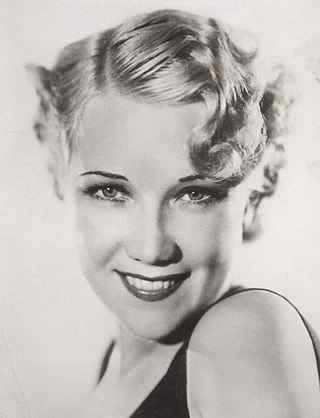
Bernice Claire was an American singer and actress. She appeared in 13 films between 1930 and 1938.
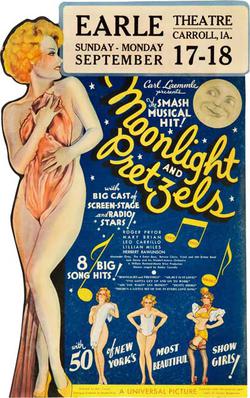
Moonlight and Pretzels is a 1933 American Pre-Code musical film directed by Karl Freund, about a man who puts on a Broadway show. The film was released by Universal Studios and featured Mary Brian and William Frawley, now best-known as "Fred Mertz" on the 1950s TV show I Love Lucy; Freund was the groundbreaking cinematographer for I Love Lucy.
Laughter in Hell is a 1933 American Pre-Code drama film directed by Edward L. Cahn and starring Pat O'Brien. The film's title was typical of the sensationalistic titles of many Pre-Code films. Adapted from the 1932 novel of the same name by Jim Tully, the film was inspired in part by I Am a Fugitive from a Chain Gang and was part of a series of films depicting men in chain gangs following the success of that film. O'Brien plays a railroad engineer who kills his wife and her lover in a jealous rage and is sent to prison. The movie received a mixed review in The New York Times upon its release. Although long considered lost, the film was recently preserved and was screened at the American Cinematheque in Hollywood, CA in October 2012.

East Lynne is a 1931 American pre-Code film version of Ellen Wood's eponymous 1861 novel, which was adapted by Tom Barry and Bradley King and directed by Frank Lloyd. The film received an Academy Award nomination for Best Picture but lost to RKO-Radio's Cimarron. East Lynne is a melodrama starring Ann Harding, Clive Brook, Conrad Nagel and Cecilia Loftus.
Dwight Oliver Taylor was an American author, playwright, and film/television screenwriter.
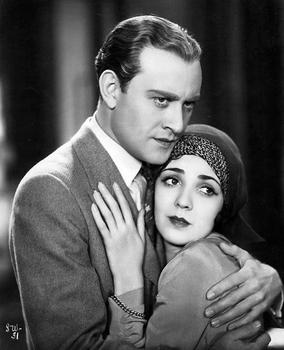
Second Wife is a 1930 American drama film produced and released by RKO Pictures. It was directed by Russell Mack, written by Hugh Herbert and Bert Glennon, based on the play All the King's Men by Fulton Oursler. The film stars Conrad Nagel and Lila Lee, two silent film veterans moving into talkies.

Spring Is Here is a 1930 American Pre-Code musical comedy film produced by First National Pictures and distributed by Warner Bros. It was adapted by James A. Starr from the 1929 musical play, of the same name, by Owen Davis, with music by Richard Rodgers and Lorenz Hart. The film stars Lawrence Gray, Alexander Gray, and Bernice Claire.

The Girl from Chicago is a lost 1927 American synchronized sound criminal romantic drama film directed by Ray Enright and starring Myrna Loy and Conrad Nagel. While the film has no audible dialog, it was released with a synchronized musical score with sound effects using the Vitaphone sound-on-disc process. The film was produced and distributed by the Warner Bros. and is based upon a short story by Arthur Somers Roche that appeared in the June 1923 Redbook.
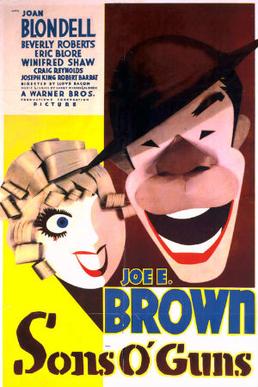
Sons O' Guns is a 1936 American comedy film directed by Lloyd Bacon and written by Jerry Wald and Julius J. Epstein. It stars Joe E. Brown, and features Joan Blondell, with Beverly Roberts, Eric Blore, Craig Reynolds and Wini Shaw. It was released by Warner Bros. on May 30, 1936.

Marianne is a 1929 pre-Code romantic-musical film set at the end of World War I. Marianne is French farm girl who, although her French fiancé is away, fighting, falls in love with an American soldier. It is a remake of a silent film that was released earlier in 1929. Although the films feature mostly different casts, Marion Davies starred in both versions. This was Davies' first released talking movie. The pictures were released less than eleven years after the Armistice, and the title would have had a profound meaning for European audiences. “Marianne” has been a beloved personification of France and the battle for democracy—and the courage of French women in particular—since the Revolution. She was a key figure in French propaganda, and American men who served in Europe in 1917-1918 would have seen representations of her all around them, in public buildings, on posters and in newspapers, on coins and postage stamps.

















